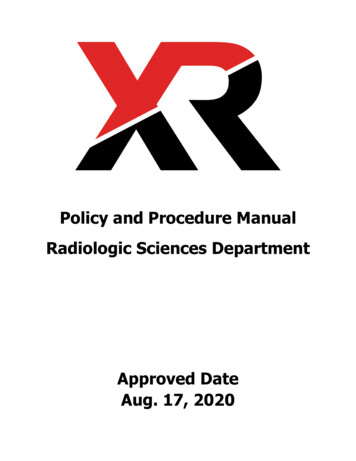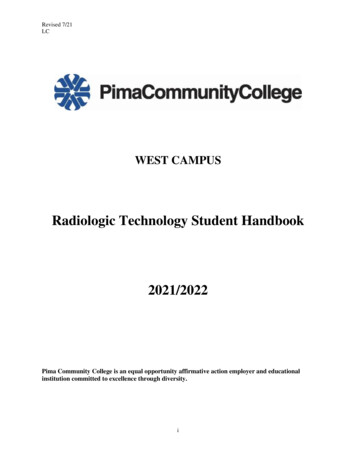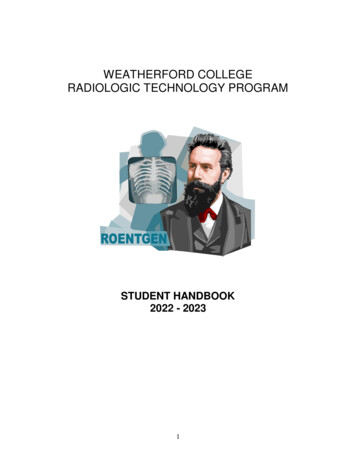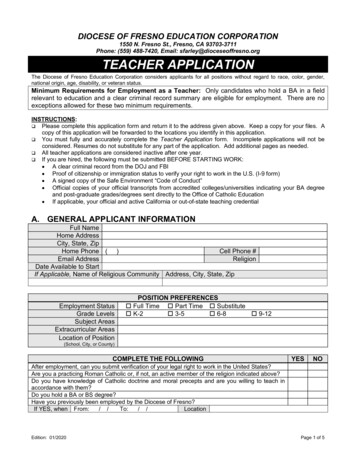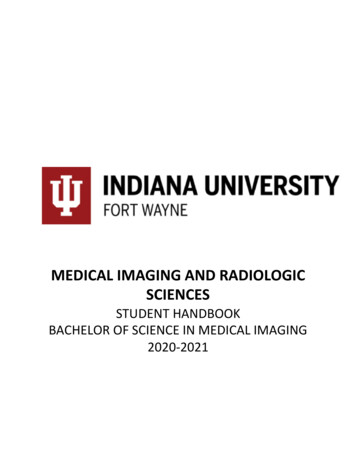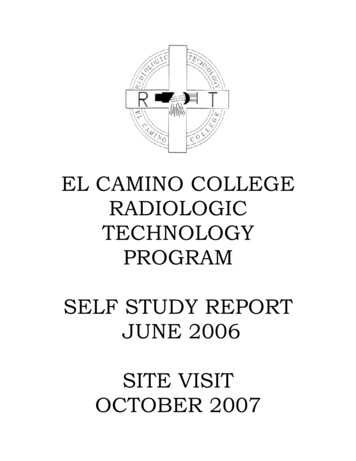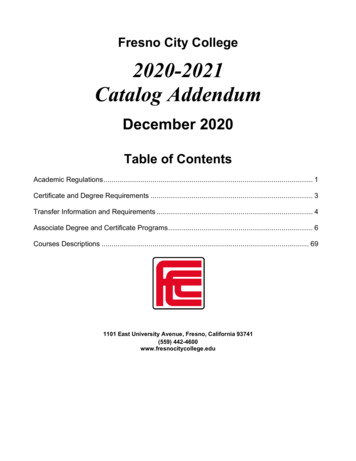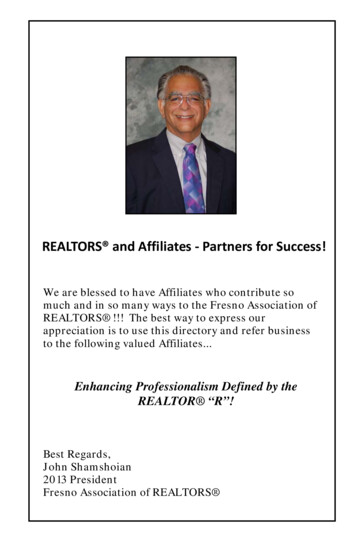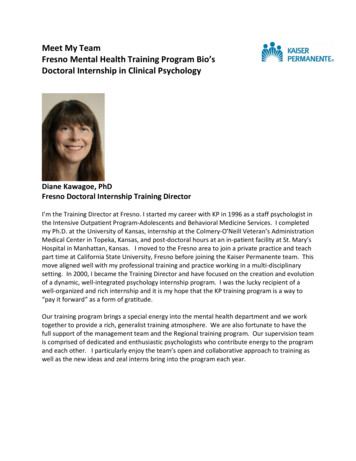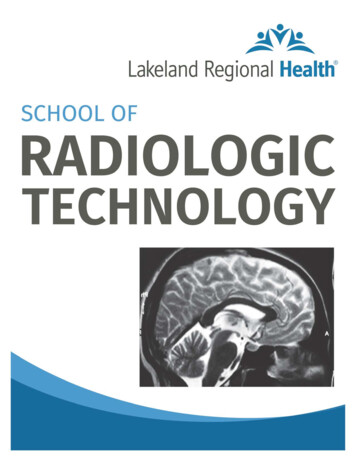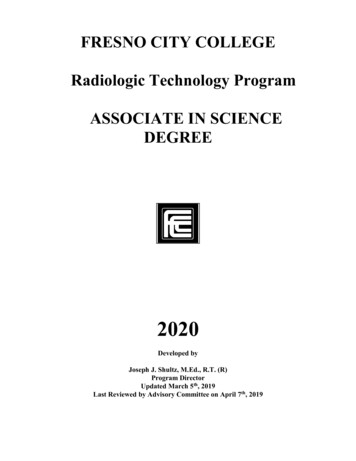
Transcription
FRESNO CITY COLLEGERadiologic Technology ProgramASSOCIATE IN SCIENCEDEGREE2020Developed byJoseph J. Shultz, M.Ed., R.T. (R)Program DirectorUpdated March 5th, 2019Last Reviewed by Advisory Committee on April 7th, 2019
FRESNO CITY COLLEGERADIOLOGIC TECHNOLOGY PROGRAMFall 2019Lorraine Smith, MBADean of Instruction; Allied Health, Physical Education, and AthleticsJoseph Shultz, M.Ed., CRT, A.R.R.T.Program DirectorScott Oaks, M.S., CRT, A.R.R.T.Director of Clinical InstructionMichael Reyna, B.S., CRT, A.R.R.T.Adjunct InstructorSal Mendoza, B.S., CRT, A.R.R.T.Adjunct InstructorJennifer Dunkley, B.S., CRT, A.R.R.T.Adjunct InstructorPhyllis WillisDepartment SecretaryNOTATIONSThe content of this handbook may be subject to change throughout the programNOTE: All courses in the Radiologic Technology Program must be completed with atminimum grade of C.THIS INSTITUTION DOES NOT DISCRIMINATE ON THE BASIS OF RACE, SEX, AGE,HANDICAP OR RELIGION.ii
TABLE OF CONTENTSIntroduction . 6Purpose of the Program . . 6Mission of Fresno City College . . 6College Institutional Student Learning Outcomes . 7Radiologic Technology Program Philosophy . 7Radiologic Technology Program Mission. 9Radiologic Technology Program Goals . 9Program Assessment Plan. 10Program Accreditation. 16The Student . 16Setting . 16Professional Behavior. 17A.R.R.T. Code of Ethics . 18Curriculum . 31Responsibilities of Students . 38Program Expenses . 38Transportation . 38Current Address . 39Before Getting Started . 39Student Success . 41Employment .41Required Documentation . 42Immunization . 42TB Skin Test . 43TB Clearance. 43Health Examination Form . 43CPR . 44General Liability Insurance/Malpractice Insurance. 44ADA Essential Job Functions . 45Disabled Students Program and Services. 47Pre-Application Review by A.R.R.T. . 47Application for Examination by A.R.R.T. 48Job Placement . 48Academic Dishonesty. 49Cheating. 49Plagiarism. 49Disciplinary Procedures . 50Suspension 50Guidelines for Professional Conduct . 51Personal Appearance. 51Uniform. 51Hair . 52Make-up and Perfume. 52Nails. 53Jewelry . 53Speech and Conversation . 53Quality of Care. 53Patient Records . 54iii
Guidelines and Policies for Clinical Education. 54Clinical Attendance . 54Making-up Clinical Education Setting Missed Hours. 55Falsification of Clinical Education Setting Timesheet, Logbook and Evaluation .55Clinical Grades. 56Clinical Exams . 57Clinical Advisement. 57Student Orientation to Clinical Facilities. 57Clinical Education Policy . 60Clinical Assignments . 60Breaks and Lunch . 61Personal Phone Calls . 62Jury Duty . 62Student Supervision . 62Direct and Indirect Student Supervision . 62Student Fluoroscopy Policy 63Mammography Policy . 63MRI Safety Screening . . . .63Clinical Education Requirements . 64Student Clinical Probation .65Clinical Radiation Protection Rules . 65Radiation Exposure Records . 65Guidelines and Policies for Didactic (Lecture) Courses . 69Attendance . 69Grading in Didactic & Laboratory Radiology Courses . .70Grade Deficiencies . 70Withdrawal from the Program . 71Re-Admission . 71Transfer Students 71Program Policy for Pregnant Student Technologists . 72Extended Sick Leave . 74Communicable Disease . 74Evaluations . . 75Graduation Requirements . 76Student Rights . 77Student Records . . .77Educational Program Standards (JRCERT) . 78Sexual Harassment Policy and Procedures . 79Student Grievance Process . 84Drug Abuse Policy . 86Guidelines for Student Assistance . 86Role of Instructors and Administration Staff . 87Appendix A . 89Dishonesty Infraction Form. 90Appendix B . 91A.R.R.T. Pre-Application Form . 92Appendix C . 96Declaration of Pregnancy . . . .97Attachment to Pregnancy Policy . 98Appendix D . 99Clinical Education Instructor Duties 100Appendix E .102Program Withdrawal Agreement . 103iv
Appendix F .104Program Pre-Requisites and General Education Requirements . 105Appendix G . . 106Students MRI Screening Form . . .107Appendix H .108Student Clinical Probation Form .109v
INTRODUCTIONWelcome to the Fresno City College Radiologic Technology Program. This studenthandbook is a supplement to the Fresno City College catalog.The purpose of the handbook is to provide information specifically related to theRadiologic Technology Program. As new policies relating to student activities areformulated, they will be added to the handbook. It is important that you keep this book asa reference throughout the program.The faculty wishes you success in this important venture in radiography education.PURPOSE OF THE PROGRAMFresno City College offers an associate degree program in Radiologic Technology withclasses beginning each August.You are entering a paramedical career Program that is interesting, diversified, anddemanding. The Program is designed to help you develop the knowledge and skillsrequired to perform in a specialized area. Many subtle qualities besides knowledge andskills are required to complete the Program successfully. An important personal qualitythat will be closely evaluated throughout your training is your ability to relate with thepatient and to provide them with both physical and emotional support. Another quality ortrait is your ability to work as part of a team and interact successfully with departmentand hospital personnel. Weaknesses spotted in any area of performance will be expectedto be resolved promptly. Counseling will be arranged if problems are significant.The Radiologic Technology faculty wishes you success in the Program. We are here toassist you in pursuing your newly chosen profession.The Board of Trustees of the State Center Community College District shall confer upona student, who has satisfactorily completed the general education and programrequirements, the Associate of Science Degree. The specific major requirements beingconsistent with those prescribed by the Board of Governors of the California CommunityCollege and the Board of Trustees of the State Center Community College District.THE MISSION OF FRESNO CITY COLLEGEFresno City College, California’s first community college, provides quality, innovativeeducational programs and support services directed toward the enhancement of studentsuccess, lifelong learning and the economic, social and cultural development of ourstudents and region.6
FRESNO CITY COLLEGE INSTITUTIONAL STUDENT LEARNING OUTCOMESIn developing suitable Institutional Student Learning Outcomes (SLO’s) forimplementation of the philosophy and purposes of the College, the college recognizes thatstudents differ greatly in experience, needs, capacities, interests, and aspirations. Withthis diversity in mind, staff members work with students to help them achieve thefollowing SLO’s:CommunicationStudents will demonstrate effective communication and comprehension skills. Comprehend, analyze and respond appropriately to oral, written, and visualinformation. Effectively communicate information through speaking, writing, and otherappropriate modes of expression.Critical Thinking and Information CompetencyStudents will demonstrate critical thinking skills in problem solving across disciplinesand in daily life. Identify vital questions, problems, or issues and evaluate the reasonableness of asolution. Analyze, assess, and evaluate the validity of an argument. Analyze multiple representations of quantitative information, including graphic,formulaic, numeric and verbal. Select and evaluate the accuracy, credibility, relevance of information sources.Community and Global Awareness and ResponsibilityStudents will demonstrate knowledge of social, cultural, environmental and aestheticperspectives. Examine individual and group responsibilities in society. Participate in active citizenship.Personal, Academic and Career DevelopmentStudents will assess their own skills, and abilities, to develop personal, educational, andcareer goals, work independently and in group settings, and identify lifestyle choicesthat promote self-reliance, financial literacy, and physical, mental and social health. Assume personal responsibility for identifying academic and psychological-socialneeds, determining resources, and accessing appropriate services. Evaluate progress towards achieving personal goals, academic goals, career goals,and career resilience.(Updated 3/6/19)RADIOLOGIC TECHOLOGY PROGRAM PHILOSOPHYFresno City College's Radiologic Technology Program believes in the overall philosophy andSLO’s of the State Center Community College District. Being an integral part of the communitycollege, the Radiologic Technology Program serves the educational needs of individuals withinits sphere. It provides graduates capable of working in structured health care facilities and invarious community settings.7
Person/ClientThe concept of person/client includes individuals, families, groups and communities. Clientrefers to an individual, his/her support groups, and/or to any group participating in and/orreceiving radiology care. Each client is characterized by dynamic components that arephysiological, psychological, cultural, ethnic, developmental, and spiritual. All of these areasinteract by influencing the client’s response to internal and external needs. The client has a rightto self-determination in meeting his/her needs. Each client is worthy of respect and concern.EnvironmentThe environment has internal and external components, which are constantly changing. Theinternal environment consists of cognitive, developmental, physiological and psychologicalprocesses, while the external environment consists of the physical and social world. Thedynamics of the internal and external environments constantly affect the client’s ability to adaptand to maintain homeostasis.HealthHealth is regarded as a state of equilibrium on a wellness-to-illness continuum. Individual healthpractices impact the value and meaning of health as determined by culture and society. Wellnessis identified as successful management of multiple stresses from internal and externalenvironments. Illness results when the bio-psycho-social system is disrupted. Theperson/client’s ability to cope with illness is influenced by how successfully he/she is able toadapt within the health care environment. The perception of wellness to illness is a highlyindividualized process, which is influenced by the client’s health beliefs and health behaviors.EducationEducation is a process involving active participation of both the student and the instructor.Radiologic Technology education blends the science and the art of technology as well asintegrating concepts from support courses and the prerequisite courses required. Education isfacilitated by communication between the faculty and students in the traditional andtechnologically enhanced learning environment.Students possess unique individual qualities that reflect their backgrounds, goals, and learningstyles. The Fresno City College students are characterized by their unique cultural and ethnicdiversity. In addition, differences in age, life experiences, support systems, education, andeconomic resources influence the students’ learning process. Students are empowered to be selfmotivated, independent critical thinkers who accept personal accountability and responsibility inthe learning process. Students will learn best when learning goals are perceived as immediatelyuseful and realistic as well as important and relevant to a person’s personal, professional andcareer needs.College wide support services exist to meet individual needs of the student. These include healthservices and counseling, library and learning resource center, radiology skills lab forindividualized tutoring and mentoring, student clubs and activities, learning disability specialists,childcare center, job placement, and financial aid.Faculty members share the belief that learning occurs best in an atmosphere of mutual respect inwhich there is an appreciation for and consideration of different learning styles. Faculty8
recognizes the varied backgrounds and experiences that each student contributes to the learningenvironment. Individual learning styles and needs are considered when designing learningexperiences to maximize the potential for success of each student. The faculty functions aseducators, facilitators, resource persons, mentors, coaches, and role models to create andmaintain a positive learning environment.StudentsStudents possess unique individual qualities. Students are encouraged to become self-motivated,independent critical thinkers who accept personal accountability and responsibility in thelearning process. Cognitive skills essential to the learning process in radiology education includeanalysis, synthesis, and the ability to transfer learning. The learning process of radiologictechnology students is augmented by the application of other academic disciplines of the college.The program is open to all individuals regardless of ethnicity, gender, religious preference or agewho have met admission standards.Radiologic Technology Faculty MembersFaculty members are committed to the goal of graduating individuals who will function safelyand efficiently as a Registered Radiologic Technologist in the health care community. Thefaculty possesses competent theoretical knowledge and clinical skills. They facilitate learning bydirecting, providing opportunity, and assisting students with the acquisition of knowledge and themastery of clinical skills. Faculty members respect the differences unique to each student’sethnic, cultural, spiritual, and learning needs.RADIOLOGIC TECHNOLOGY PROGRAM MISSIONIt is the mission of the Radiologic Technology Program at Fresno City College to prepareand graduate students with the entry-level skills required for careers in radiography, andto become employable in the community, the state of California, the Nation and theinternational arena.RADIOLOGIC TECHNOLOGY GOALSIt is the policy of the Fresno City College Radiologic Technology Program to ensureexcellence in education through a means of goals, SLO’s and assessment. Continuousmonitoring of the Program’s mission, goals and outcomes has been implemented toenable the Program to consistently maintain student success. Compliance is aidedthrough a multitude of surveys that cover the degree of satisfaction with all aspects of theProgram. Survey feedback is the driving force by which the Program implementspositive changes and monitors its success. The goals are as follows:1.Students will graduate with a high degree of competency and knowledge.2.Students will graduate with effective oral and written communication skills.3.Students will graduate with critical thinking and problem solving abilities.4.Students will graduate with the knowledge and practical skills that maintain thestandards of professional and ethical values.9
5.The program will monitor its overall effectiveness.Program Assessment PlanTo ensure continuous program improvement, the program employs an ongoing andsystematic assessment process to measure and document student learning outcomes. TheFresno City College Radiologic Technology Program uses the following assessment plan tomonitor its success:10
GOAL # 1 Students will graduate with a high degree of clinical competency and knowledge.OutcomesStudents willproduce diagnosticimages.Students will applypositioning skills.Students will selectappropriatetechnical factors.Students willpractice properradiationprotection.Measurement ToolBenchmarksTimeframeResponsible PartyClinical Image Evaluationform, line items 3, 4, and5.Students will score an average of 3.0 or higheron image evaluation. (0 to 5 point scale)Fifth and Sixth SemestersClinical coordinator,Program director, andAdjunct FacultyLaboratory ImageEvaluation form, lineitems 3, 4, and 5.Students will score an average of 3.0 or higheron image evaluation. (0 to 5 point scale)First and Second SemestersRad 1B and Rad 2BInstructorsStudent ClinicalEvaluation form area “D”,1.Students will score an average of 75% or higheron demonstration of positioning skills.(0 to100% scale)Fifth and Sixth SemestersClinical InstructorsLaboratory PositioningBookStudents will score an average of 75% or higheron procedure evaluations. Random sampling offour procedures per student.(0 to 100%scale)First and Second SemestersRad 1B and Rad 2BInstructorsStudent ClinicalEvaluation form area “D”,2.Students will score an average of 75% or higheron proper selection of technical factors. (0 to100% scale)Fifth and Sixth SemestersClinical InstructorsLaboratory ImageEvaluation form, line #3Students will score an average of 3.0 or higheron knowledge of technique. (0 to 5 point scale)First and Second SemestersRad 1B and Rad 2BInstructorsStudent ClinicalEvaluation form area “D”,5.Students will score an average of 75% or higheron radiation protection for self and patient. (0 to100% scale)Fifth and Sixth SemestersClinical InstructorsLaboratory PositioningBookStudents will score an average of 75% or higheron patient shielding area of procedureevaluations. Random sampling of fourprocedures per student. (0 to 100% scale)First and Second SemestersRad 1B and Rad 2BInstructors11Results
GOAL # 2 Students will graduate with effective oral and written communication skills.OutcomesStudents willdisplay effectiveoralcommunicationskills.Students willdisplay writtencommunicationskills.Measurement ToolBenchmarksTimeframeResponsible PartyStudent ClinicalEvaluation form area“B”, 1.Students will score an average of 75% or higherfor adequate patient communication on theirclinical evaluation by greeting patients,introducing self, and checking I.D. bracelet. (0to 100% scale)Fifth and Sixth SemestersClinical InstructorsStudent ClinicalEvaluation form area“B”, 2.Students will score an average of 75% or higherfor adequate patient communication on theirclinical evaluation by explaining the procedure inlay terms and keeping patients informed of theexaminations progress.(0 to 100% scale)Fifth and Sixth SemestersClinical InstructorsAPA style gradingrubric.Students will achieve a score of 75% or better ontheir pathology research paper. (0 to 100%scale)Third SemesterClinical CoordinatorStudent ClinicalEvaluation form area“B”, 3.Students will score an average of 75% or higherfor proper written communication when takingpatient histories and closing out examinations. (0to 100% scale)Fifth and Sixth SemestersClinical Instructors12Results
GOAL # 3 Students will graduate with critical thinking and problem solving abilities.OutcomesStudents willpossess criticalthinking ability.Students willadapt positioningfor traumapatients.Measurement ToolBenchmarksTimeframeResponsible PartyAPA style gradingrubric, line #5Students will demonstrate critical thinking byarriving at a sound conclusion on their pathologyresearch paper and scoring 15 points or better outof a possible 20 points.Fourth SemesterRad 4A InstructorsStudent ClinicalEvaluation form area"D", 2.Students will score an average of 75% or higherfor critical thinking skills by manipulatingtechnique for non-routine examinations.(0to 100% scale)Fifth and Sixth SemestersClinical InstructorsStudent ClinicalEvaluation form areas“D”, 1, “F”, 4.Students will score an average of 75% or betterfor problem solving abilities by demonstratingadaptability to difficult clinical examinations. (0to 100% scale)Fifth and Sixth SemestersClinical InstructorsTrauma positioningfinal examination.Students will demonstrate problem solving byscoring 75% or better on the "Hands-On" traumaexamination in their positioning class.(0to 100% scale)Second SemesterRad 2B Instructors13Results
GOAL #4 Students will graduate with the knowledge and practical skills that maintain the standards of professional and ethical values.OutcomesStudents willunderstand theimportance ofethical andprofessionalbehavior.Students willpursue continuedprofessionaldevelopment.Measurement ToolBenchmarksTimeframeResponsible PartyEthics Final ExaminationStudents will demonstrate knowledge of ethics byachieving a score of 75% or better on their ethicsfinal examination. (0 to 100% scale)End of third semesterRad 3A InstructorsStudent ClinicalEvaluation form areas“A”, 1 - 2, “F” 1 - 6.Students will score an average of 75% or better onthe ethical and professional areas of the StudentClinical Evaluations.(0 to 100%scale)Fifth and Sixth SemestersClinical InstructorsProfessional ConferenceStudent Tracking FormAll students will attend at least 1 professionalfunction i.e. CSRT, RTCC, or medicalconference.End of programProgram DirectorIntern Exit Surveyline # 525% or more of graduating students will plan toseek advanced education.(0to 100% scale)End of programProgram DirectorIntern Exit Surveyline # 675% or more of graduating students will plan tojoin the ASRT, CSRT, or other professionalgroups. (0 to 100% scale)End of programProgram Director14Results
GOAL # 5 The program will monitor its overall effectiveness.OutcomesStudents willcomplete the 1styear of theprogram.Students willcomplete the 2ndyear and graduatefrom the program.Students will passthe ARRT NationalRegistryExamination on thefirst attempt.Graduates will besatisfied with theireducation.Employers will besatisfied with thegraduate’sperformance.Graduates whodesire employmentwill be employedwithin 12 monthsafter graduation.Measurement ToolBenchmarksTimeframeResponsible PartyNumber of studentsentering the second yearwill be compared tothe number beginning theprogram.85% of the students entering the program willcontinue on to the second year of the program. (0to 100% scale)End of third semesterProgram DirectorNumber of studentsgraduating from theprogram will becompared to the numberbeginning the program.80% of the students entering the program willcontinue on to complete the program. (0 to 100%scale)End of second yearProgram DirectorARRT ExaminationResultsOver a rolling 5-year period, 80% of the studentsgraduating from the program will pass theNational Registry on 1st attempt.(0 to100% scale)Annually upon receiptProgram DirectorIntern Exit Survey Formline # 9.Intern Exit surveys will average 3’s or better forprogram and curriculum satisfaction.(0 to 4point scale)End of programProgram DirectorClinical EducationSetting Evaluation ofProgram Form line #9Clinical Education Setting Evaluation of Programsurveys will average 3’s or better for the programand graduates.(0 to 4 pointscale)Up to 3 mon
FRESNO CITY COLLEGE Radiologic Technology Program ASSOCIATE IN SCIENCE DEGREE 2020 Developed by . Joseph J. Shultz, M.Ed., R.T. (R) Program Director
